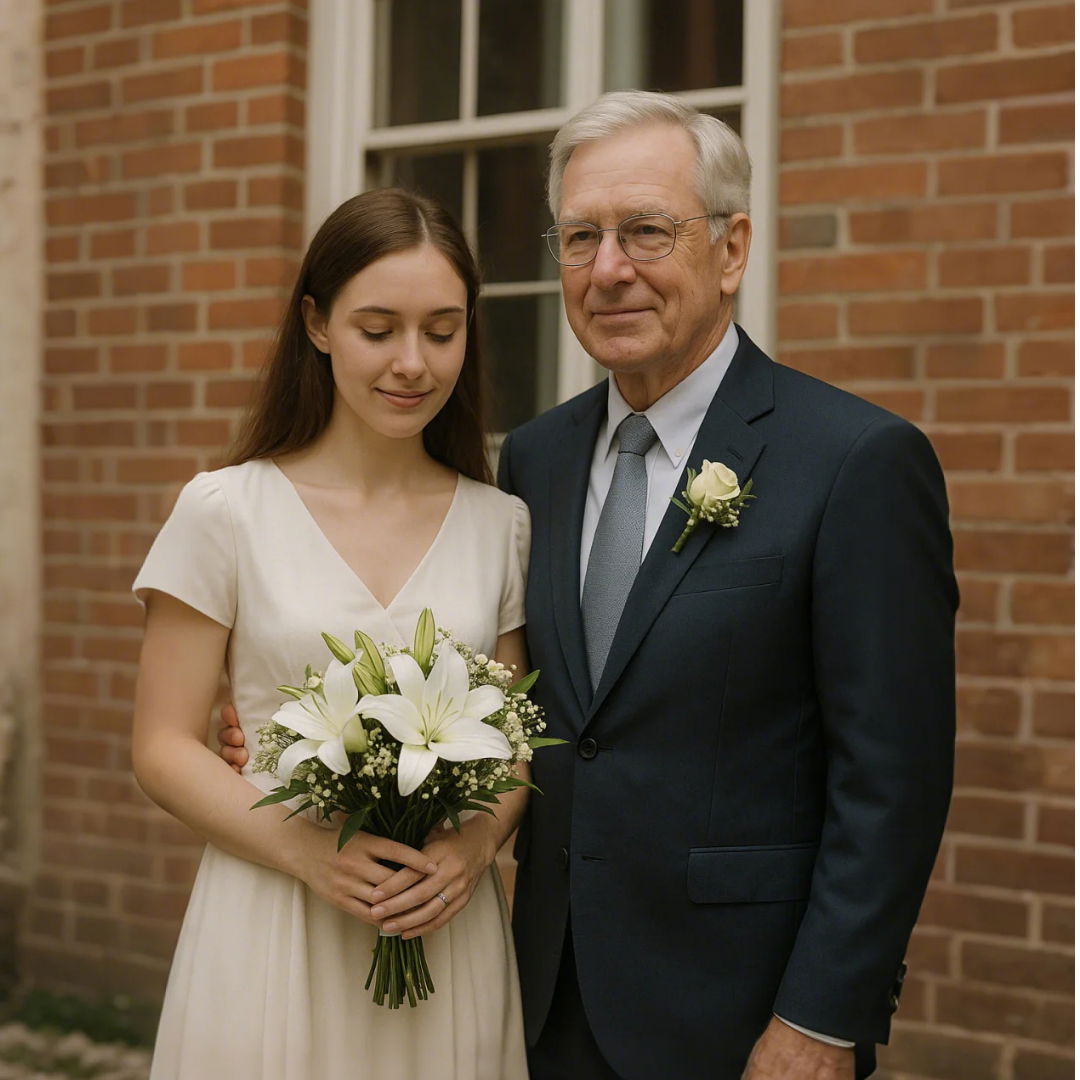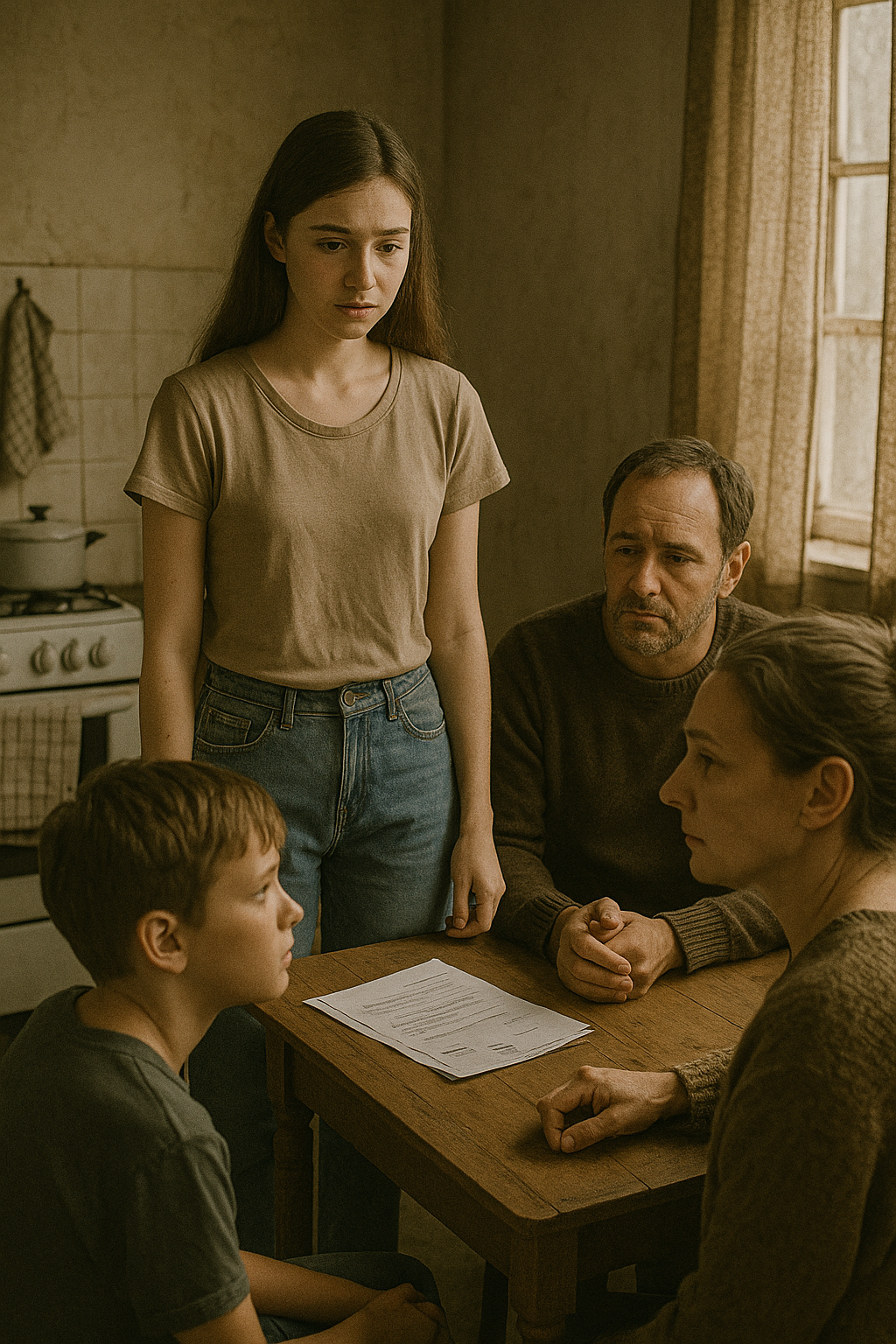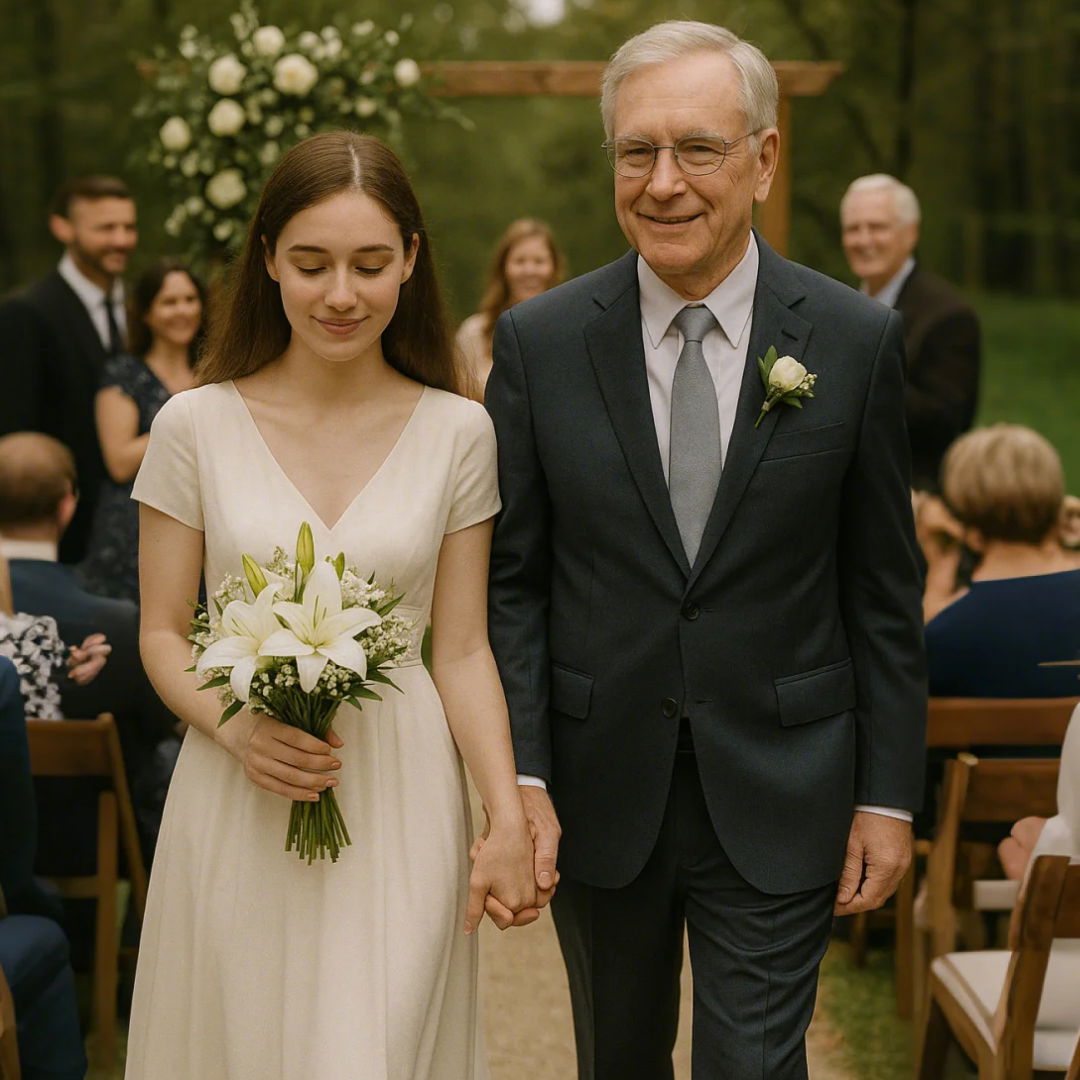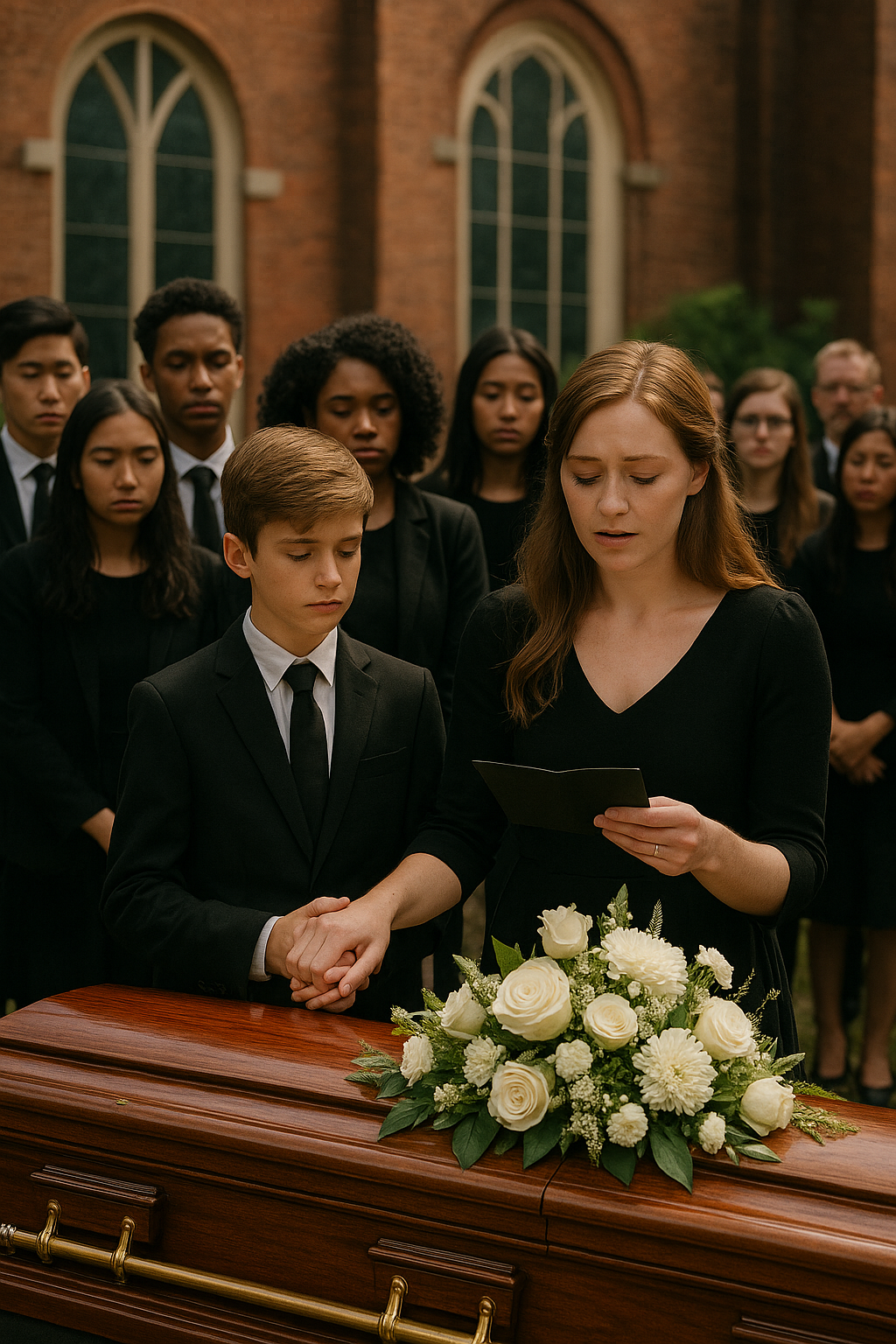When 21-year-old Emma Thompson walked into the courthouse with a bouquet of white lilies and a trembling smile, everyone stared. Standing beside her, calm and dignified, was Arthur Bennett — silver-haired, sixty, and dressed in a navy-blue suit that shimmered in the morning light. Whispers followed them like shadows. But Emma only tightened her grip on Arthur’s arm and walked ahead.

To the world, their marriage looked odd. But to Emma, it was the beginning of salvation.
Emma had always been a top student. Smart, diligent, and quiet, she earned a full scholarship to university while juggling two part-time jobs. Her parents, Mark and Linda, were kind-hearted but broke. Her father had been laid off from the factory two years ago. Her mother cleaned homes, working herself to exhaustion. And her little brother, Liam, just 10 years old, needed surgery for a heart condition the family couldn’t afford.
Debt collectors called daily. The fridge was often empty. And the winter ahead looked brutal.
Emma tried everything. Scholarships, grant applications, tutoring jobs — but the hospital bills alone were staggering. One night, she found her mother crying in the kitchen, cradling a stack of unpaid bills.
“I’ll find a way,” Emma whispered, hugging her.

But what could a student with no income do?
That’s when Mrs. Gallagher, the elderly woman Emma tutored weekly, said something curious.
“I once knew a man who offered to marry a woman so she could inherit his estate early,” she said over tea, as if recalling an old romance novel. “He didn’t want companionship — just someone he could trust, someone kind.”
Emma had laughed awkwardly. “That sounds… unusual.”
But the words stayed with her.
Later that week, Mrs. Gallagher handed her a card with the name Arthur Bennett on it. “He’s not looking for love,” she said. “He’s just… tired of distant relatives waiting for him to die so they can take everything. He wants his legacy to mean something.”
Emma stared at the name. “What would I have to do?”
“Marry him. Live with him. Be his legal wife. No expectations. He’s very clear about that. But you must be kind and honest. That’s all.”
Emma didn’t call him right away. But after her brother collapsed during gym class and was hospitalized again, she sat on the edge of her dorm bed, trembling, and dialed the number.
Arthur Bennett was unlike anyone Emma had met.
He was polite, composed, and surprisingly warm. A retired architect with no children, he lived in a restored country estate outside the city. He loved books, classical music, and sipping tea while watching the sunrise.
“I don’t believe marriage has to be about romance,” he told her during their second meeting. “Sometimes, it can be about mutual respect — and creating something good together.”
Emma was upfront. “I need to help my family. That’s the only reason I’m considering this.”
“And I need someone who’ll make sure my estate is used for something meaningful, not squandered by distant cousins who never visit,” he said.
They agreed on terms: She would live in the estate. She could continue her studies. She would help manage his charity foundation. And once married, Arthur would cover Liam’s surgery and pay off her parents’ debts.
It felt surreal. But it was real.
They were married in a small civil ceremony two weeks later.

To Emma’s surprise, life with Arthur wasn’t strange — it was peaceful.
They lived in separate bedrooms. Their relationship was more like that of friends or mentor and student. He encouraged her studies, attended her graduation, and even helped her apply to graduate school.
Emma, in turn, managed his estate, helped restructure his foundation to fund scholarships for underprivileged youth, and slowly brought life back into the old house.
“I never thought I’d hear music and laughter here again,” Arthur said one evening, watching Emma teach Liam how to play piano in the drawing room.
She smiled. “I never thought I’d be the one playing it.”

As the years passed, people stopped whispering. Neighbors saw Emma planting flowers in the garden, hosting charity dinners, smiling warmly beside Arthur at community events. She wasn’t a gold-digger. She was a force of kindness and energy, and Arthur glowed around her.
On the morning of Emma’s 25th birthday, Arthur surprised her with a trip to Scotland. They visited ancient castles and slept in cozy inns. On the last night, Arthur handed her a worn envelope.
“I wrote this before we married,” he said. “But I wanted you to read it only when the time felt right.”
Inside was a letter.
Dear Emma,
If you’re reading this, then thank you.
Thank you for bringing sunshine into my final chapter.
I know I had little time left. The doctors warned me of the heart condition. I kept it quiet because I didn’t want pity — or panic.
When I chose to marry you, it wasn’t just to protect my estate. It was to give something of meaning before I left. And what you’ve done with it — the foundation, your family, your kindness — it means more to me than I can express.
If I’m gone when you read this, know that everything — the house, the accounts, the foundation — is now yours to manage. I trust you more than anyone.
But if I’m still here… well, let’s get cake. You’re 25!
Yours with great respect,
Arthur
Emma clutched the letter, tears blurring her eyes.
Arthur placed a gentle hand on her shoulder. “I’m still here,” he said with a smile. “So let’s go get that cake.”

Arthur lived longer than doctors predicted. Five more years, in fact.
During that time, Emma’s foundation became a regional success, helping hundreds of students. She earned a master’s degree in public administration and was offered positions in major nonprofit organizations.
But she stayed.
“I belong here,” she told Arthur one evening. “This house… this mission… this is home.”
Arthur simply nodded. “I knew you were the right choice.”
When Arthur passed away peacefully at 67, the town mourned. At the funeral, Emma stood beside the coffin, hand in hand with Liam — now a healthy teenager — and dozens of foundation scholars who owed their education to Arthur and Emma’s work.
She spoke softly.
“People questioned our marriage. But he gave me the greatest gift — not just a second chance, but a purpose. And I will carry that forward.”
Emma didn’t remarry right away. She focused on the foundation, expanded its reach nationally, and created an architecture scholarship in Arthur’s name.

One afternoon, while reviewing files in the estate library, she found a dusty box tucked behind a bookshelf. Inside were sketches — dozens of them — for a children’s hospital designed by Arthur decades ago, but never built.
“I always wanted to,” he had once said, “but never found the right person to lead it.”
Emma smiled. “Then I guess it’s time.”
Three years later, The Arthur Bennett Children’s Wellness Center opened on the edge of town, filled with bright murals, laughter, and life.
A New Beginning
At 32, Emma stood once again in front of a courthouse. But this time, she wasn’t holding lilies. She was holding blueprints — and the hand of a fellow architect, Thomas, who had joined her foundation team two years earlier.
They weren’t rushing into anything. But he admired her strength. And she admired his patience.
“When you’re ready,” he said, “I’ll be here.”
And Emma, who had once married out of duty, now stood in front of a new chapter — not out of desperation, but love.
People still whispered sometimes.
“She was the girl who married a 60-year-old man.”
But now, they added:
“She turned it into something beautiful.”
Emma often visited Arthur’s memorial bench under the willow tree in the garden. She brought lilies. She read him letters. And she always ended with:
“Thank you, Arthur. For believing in me. For saving my family. For helping me become who I am.”
And in the stillness, the wind through the leaves almost sounded like a soft whisper in return:
“Thank you, Emma.”


